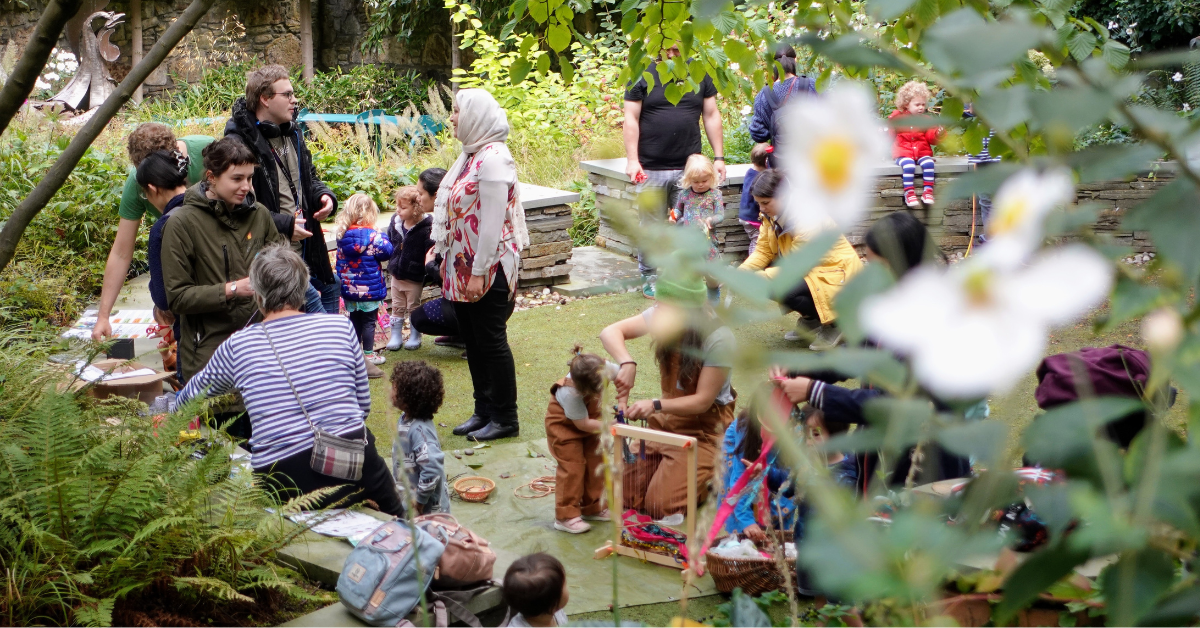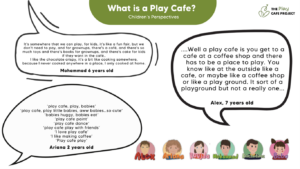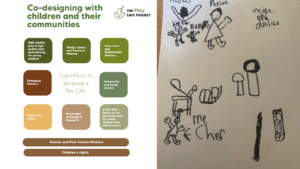What are Play Cafes? Young children’s experiences of play and public life

Authors
Dr Kristina Konstantoni, University of Edinburgh
Dr Reyhaneh Mozaffar, University of Edinburgh
Aggeliki Dimoulia, Network for Children’s Rights, Greece
Iffah Humaira Eri Tantawi, University of Edinburgh
Where do young children play in public life? Are these social and play spaces designed with young children and their communities in mind? What would an ideal social and play space look and feel like from young children’s and their communities’ perspectives? What would an ‘inclusive’/ equitable social and play space look and feel like?
These are some of the questions our Play Cafe Project (“The Play Cafe Project: What would Froebelian play cafes look like?”), funded by the Froebel Trust, is exploring in two contexts: Greece and Scotland.
The project involved working together with a group of six young children advisors (from ages 1.5 to 6 years old) in Scotland and Greece, and a group of young children advisors (4 to 8 years old) from the Network for Children’s Rights ‘Culture Lab’ in Greece. As part of The Play Cafe research project experiences, we are also working closely with 40 families in different geographical locales in Scotland and Greece through ethnographic and participatory processes.
Recently we shared our emerging critical insights from the research with the Scottish Government, and we wrote a briefing based on our research, community-based and co-design work with more than 400 participants.
Some highlights from this work include that young children and their families face many barriers and experience many intersecting inequalities when playing in public life, especially indoors. Not all children have access to the same spaces and experiences; for example, recent refugee families or migrant families that do not speak English or migrant autistic/neurodivergent children feel isolated and do not always access public spaces due to fear of discrimination and racism. High-quality play and social spaces are very rare and families that attended the Froebelian pop-up play cafe (in Scotland) considered it an ideal social and play space. Despite the lack of high-quality play provisions, children were observed to be active agents in reclaiming play spaces creatively; however, there is a strong desire for the creation of high-quality play cafes in diverse communities/neighbourhoods.
One of the key focuses of the play cafe project is how young children and their communities conceptualise as play cafes:
What are play cafes?

The above children conceptualised play cafes as inter/intra-generational social and play spaces, that are free (in terms of payment). Play cafes are viewed here as places for connection, for looking after each other (care/love), and for eating. Play cafes were also considered fun and as spaces that have play resources and books, paint, music and experiences linked to dance and food/cooking. Play cafes are considered spaces which offer ‘hands-on’ everyday and real experiences (e.g., ‘making coffee’), spaces where you can go into imaginative worlds and spaces that you can be with friends. Play cafes have inside and outside spaces and are like playgrounds but not exactly like the ones that we currently find in public life and outdoors. Play cafes were also viewed by some children as spaces for intersectional and intergenerational activism, for example spaces that should be accessible to ‘poor people’ too and/or people from marginalised backgrounds.
As part of our research, our community-based and co-design initiatives, children and parents/carers have shared with us what matters when we create ideal social and play spaces for them. We have named these the ingredients to designing a Play Cafe. Please see here and the briefing for more details:

As we are developing this work, we are coming to conceptualise play cafes as important types of informal high-quality play and social provisions in public life for young children and related adults, as life-affirming spaces and initiatives and as spaces for intergenerational and intersectional activism.
Understanding the various nuances and intersectional conceptualisations around ‘high quality’ play is a complex practice as it evolves over time (Nxumalo 2019; Viruru 2001) and it also needs to be decolonised (Nxumalo, 2019) by critically reflecting on and disrupting the dominance of universalist, white Western, and Eurocentric ideals (Nxumalo 2019; Viruru 2001; Pacini-Ketchabaw 2014).
What does this mean for us in this context?
- How do we decolonise Froebelian early childhood pedagogical practices? Can we?
- How can we offer high quality play spaces and at the same time disrupt the use of a universal checklist (which is influenced by white Euro-centric Western practices) (Viruru 2001; Nxumalo 2019; Pacini-Ketchabaw 2014) in creating existing play spaces for children?
- Through this project, how are we going to learn from those who have been engaging in this work of decolonisation (within and beyond early childhood), to decolonise our own minds, processes and practices? What does this mean practically?
These are some of the critical reflective thoughts we are grappling with as we advance this work.
For more details about the project
https://linktr.ee/playcafeproject
References
Konstantoni, K. (2022). Radical democratic citizenship at the edge of life: Young children, cafés and intergenerational and intersectional activism. Identities, 29(1), 80–87. DOI: 1070289X.2021.2017591
Konstantoni, K. & Emejulu, A. (2017) When intersectionality met childhood studies: the dilemmas of a travelling concept. Children’s Geographies, 15(1), 6–22, DOI: 10.1080/14733285.2016.1249824
Nxumalo, F. (2019). Decolonizing Place in Early Childhood Education (1st ed.). Milton: Routledge. DOI: 10.4324/9780429427480
Pacini-Ketchabaw, V. (2014). Postcolonial and Anti-Racist Approaches to Understanding Play. In SAGE Handbook of Play and Learning in Early Childhood. SAGE: London.
Viruru, R. (2001). Early Childhood Education: Postcolonial Perspectives from India. New Delhi: Sage.
About the authors
Kristina Konstantoni, Senior Lecturer in Childhood Studies, PI on The Play Cafe Project: What would Froebelian play cafes look like? funded by the Froebel Trust, University of Edinburgh
Reyhaneh Mozaffar, Research assistant on the The Play Cafe Project: What would Froebelian play cafes look like? funded by the Froebel Trust,University of Edinburgh
Aggeliki Dimoulia, Research assistant on the The Play Cafe Project: What would Froebelian play cafes look like? funded by the Froebel Trust, Network for Children’s Rights, Greece
Iffah Humaira Eri Tantawi, Research assistant on the The Play Cafe Project: What would Froebelian play cafes look like? funded by the Froebel Trust, University of Edinburgh
A note of thanks
We really appreciate and would like to acknowledge and thank children, colleagues, parents/carers, grandparents and community partners for our work together.
A special thank you to Pavithra Sarma for her continuous patience, care, wisdom and critical conversations with the team, as we continue to develop this work further.




Comments are closed
Comments to this thread have been closed by the post author or by an administrator.